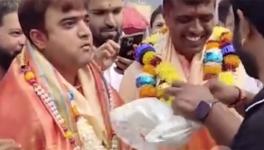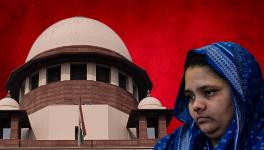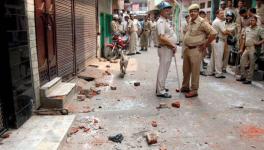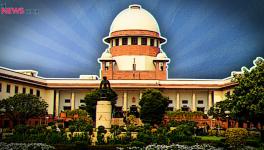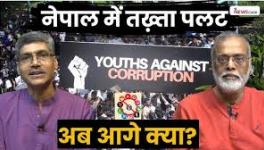Ex-IPS Sanjiv Bhatt’s Incarceration in 22-Year Old Case, a Victimisation?

The former Indian Police Service (IPS) officer Sanjiv Bhatt’s wife has levelled allegations against the government that it has left no stone unturned in trying to “subdue” and “harass” her family.
The security cover provided to him was removed in July this year, even though the government – says his wife Shweta Bhatt – is fully aware of the threats to him, as he is one of the main witnesses of the 2002 pogrom in the state.
A couple of days after his security was revoked, the Ahmedabad Municipal Corporation (AMC) suddenly demolished parts of Bhatt’s house, in which they had reportedly lived for the past 23 years. “This was done on absolutely illegal and flimsy grounds. They demolished the kitchen, the washrooms and parts of the bedrooms, while making sure to do irreparable damage to the structural integrity of the entire house,” she said.
Sanjiv has been languishing in the jail for over a month now in connection with a 22-year-old case of alleged planting of drugs to arrest an advocate when he was posted at Banaskantha district as superintendent of police in 1996.
The Banaskantha Police led by Sanjiv – the police said – had arrested one Sumersingh Rajpurohit, a lawyer, in 1996 on charges of possessing around 1 kg of drugs.
The district cops – at that time – had claimed that the drugs were found in a hotel room, which was occupied by Rajpurohit at Palanpur town in the district.
However, the Rajasthan Police, following an investigation, revealed that Rajpurohit was falsely implicated by the Banaskantha Police to compel him to transfer a disputed property at Pali in Rajasthan. It also stated that it found that Rajpurohit was allegedly picked up by the Banaskantha Police from his residence at Pali in Rajasthan.
Following Rajasthan Police’s probe, IB Vyas – former police inspector of Banaskantha – had moved the Gujarat High Court in 1999, demanding a thorough inquiry into the matter. In June this year, the high court had handed over the investigation to the Criminal Investigation Department (CID), while hearing the petition, and had asked it to complete the probe in three months.
“The CID (Crime Branch) entered our house at 8 a.m. on the grounds of picking up my husband for recording his ‘statement’. It is worth mentioning that the officers of the CID Crime Branch entered our bedroom while I was sleeping there, in full knowledge, shamelessly invading my privacy, despite Sanjiv having already met with them and while he was changing to leave with them,” said Shweta.
Sanjiv was detained, and arrested on September 5. “Led by two officers, an entire unit of policemen barged into our house, covering it inside and out, some even trying to enter our bedroom until they were stopped by my son,” she said narrating the sequence of events.
Sanjiv was presented in the Palanpur court the next day and the investigators sought a remand of 14 days. But, the court refused to grant remand, observing that “there is no justifiable ground to grant the police remand at this stage”.
The magistrate’s application of the law was labelled as an “act of insubordination”, and her decision was challenged in the Gujarat High Court on September 7. The High Court on September 11 granted 10-day remand to the state police.
Shweta moved the Supreme Court challenging the remand order granted by the High Court, which heard the matter on September 24. Chief Justice of India (CJI) Ranjan Gogoi – who was CJI designate at that time – observed that the allegations levelled by the petitioner that Shanjiv Bhatt was not being allowed to move to the courts against his incarceration were “very serious”, and asked the state government to file an explanation within one week.
“If an accused says that he is not being allowed to move court, it is very serious,” the court had said after hearing for Sanjiv’s wife Shweta.
The apex court heard the matter on October 4. Incidentally, by this time the remand period would already be over. Sanjiv was moved from police custody to judicial custody on September 21.
Observing that the remand period was already over, the top court on October 4 dismissed the petition, directing the lawyers to “move the appropriate court” for the bail application.
The bail application filed in the Sessions Court was heard on October 10. “In an attempt to further delay the process, the state requested for more time to prepare an affidavit challenging our bail application, and was subsequently granted time till October 16. It has now almost been a month since Sanjiv’s remand period elapsed; however, Sanjiv still remains in custody,” said Shweta.
She said the sequence of events clearly suggests “how scared the government is of Sanjiv Bhatt and to what extent they would go to try to intimidate him and his family”. “We live in a country where democracy and judiciary should be celebrated instead of being subverted, and used for personal benefits and vendettas. As an Indian, I feel deeply ashamed of seeing the current sorry state of affairs in the country and the way this government is punishing and hurting whistleblowers everywhere. This needs to come to an end, we need to bring this to an end,” she added.
The next hearing on the bail plea is on October 16. “We really hope that justice does prevail on that day,” she said alleging that “this is how the government does systematic victimisation of whistleblowers and opponents”.
She urged people to come forward, and raise voice irrespective of their political ideologies. “These are the actions of a government left unquestioned. Is it not time that we hold the government responsible for their actions? Today it is us, tomorrow it could be you,” she concluded.
Sanjiv had taken on Narendra Modi – the then chief minister of Gujarat – for allegedly being complicit in the 2002 Gujarat riots. He had filed an affidavit in 2011in the Supreme Court, accusing Modi of being complicit in the pogrom.
He had claimed that he was present in the meeting wherein the then chief minister had asked senior police officers of the state to "let them (the rioters) vent their anger".
The riot was triggered following a massive fire in the Sabarmati Express train – which had a large number of Karsevaks (Hindu pilgrims) on board who were returning from Ayodhya in Uttar Pradesh after a ceremony at the disputed Babri mosque site – had killed 59 people after the train stopped near the signal after it left the platform at Godhra on February 27, 2002.
The charred bodies were paraded on the roads of Ahmedabad, causing communal atmosphere going out of control.
Bhatt was later suspended in 2011 on charges of remaining absent from duty without permission and misuse of official vehicles, and was later sacked in August, 2015.
Get the latest reports & analysis with people's perspective on Protests, movements & deep analytical videos, discussions of the current affairs in your Telegram app. Subscribe to NewsClick's Telegram channel & get Real-Time updates on stories, as they get published on our website.












